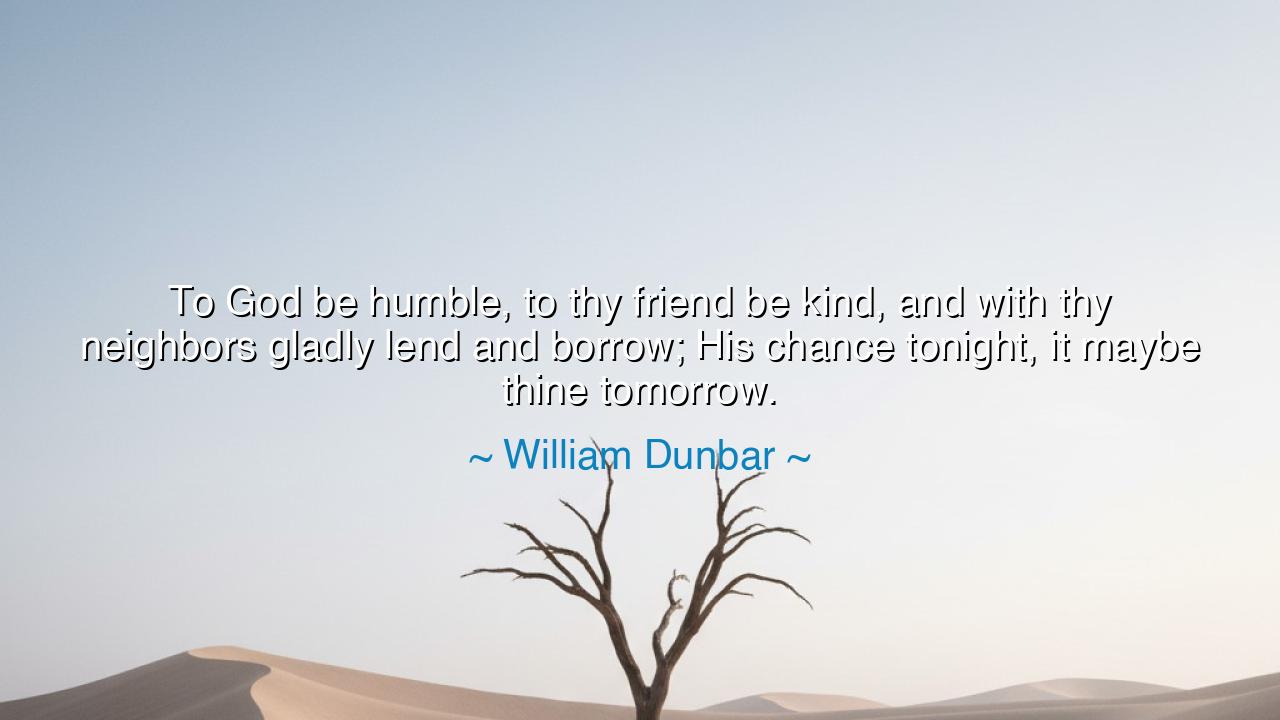
To God be humble, to thy friend be kind, and with thy neighbors
To God be humble, to thy friend be kind, and with thy neighbors gladly lend and borrow; His chance tonight, it maybe thine tomorrow.






In the great journey of life, where each soul walks upon the earth, there are guiding principles that, if followed, lead to peace, harmony, and a heart unburdened by regret. William Dunbar, a sage of words, speaks to the very core of human existence with his timeless wisdom: “To God be humble, to thy friend be kind, and with thy neighbors gladly lend and borrow.” These words, steeped in ancient wisdom, teach us not only the value of humility, kindness, and generosity but also the deep understanding that the ebb and flow of fortune, like the tides of the sea, belong to all. In this simple yet profound verse, Dunbar weaves a tapestry of virtues that are as vital to the human spirit today as they were in the days of old.
First, Dunbar bids us to humble ourselves before God. This humility is not weakness but a recognition of our place in the grand design of the universe. To be humble before God is to acknowledge that we are but fleeting shadows in the grand expanse of time. It is to surrender our egos, our pride, and our self-will to the higher forces that guide the cosmos. In doing so, we find strength—not in our own arrogance, but in the wisdom that comes from acknowledging that we do not control the universe, nor do we hold the answers to its deepest mysteries. The truly humble heart is open to learning, open to growth, and open to the love that flows from a greater source.
Next, Dunbar speaks of being kind to our friends. How often do we, in our human frailty, forget the value of genuine kindness? Friendship is not simply a matter of shared moments or common interests; it is the sacred bond of understanding and compassion. To be kind to a friend is to offer a hand when they falter, to share in their joy and sorrow with equal heart. True kindness does not expect repayment—it does not ask for recognition or accolades. It is a quiet, powerful force that binds people together, that strengthens communities, and that elevates the human spirit. As Dunbar reminds us, kindness is the foundation upon which true friendships are built, and it is through such acts that the soul finds its deepest connection to others.
In the third part of his wisdom, Dunbar calls us to lend and borrow gladly with our neighbors. This command is not simply a call for generosity, but a reminder of the deep interconnectedness of all people. Lending and borrowing are not just acts of transaction; they are symbolic of the trust and reciprocity that bind humanity. When we lend, we share not only our material goods but our spirits, our faith in the goodness of others. And when we borrow, we humbly acknowledge that we are not isolated in our struggles, but part of a greater whole. It is through this sharing, through the act of giving and receiving, that we foster bonds of trust and love in our communities.
Consider the story of Marcus Aurelius, the great Roman emperor who ruled with both wisdom and humility. Though he was a man of immense power and wealth, he never lost sight of the interconnectedness of all people. As emperor, he often spent time with his soldiers and advisors, listening to their needs, offering counsel, and practicing generosity in ways both large and small. He knew that his power was not his alone—it belonged to the people, to the empire. In this, we see that the virtue of lending and borrowing, of giving and receiving, is not limited by status or wealth. It is a universal law that binds us all, from the lowest to the highest.
And finally, Dunbar teaches us a lesson of fate: “His chance tonight, it maybe thine tomorrow.” In the cycle of life, we are often called to lend a hand, but we must also be prepared to borrow one in return. Fortune is fickle, and the world of chance moves like the wind. What is ours today may not be so tomorrow, and what belongs to another today may one day belong to us. This truth, if understood deeply, teaches us the importance of humility and kindness, for we never know when the tides of fortune will shift. By living with an open heart, a generous spirit, and a readiness to lend or borrow as needed, we remain connected to the flow of life’s ebbs and tides.
Thus, dear listeners, let this ancient wisdom guide your actions: Be humble before the higher forces that govern the universe, be kind to your friends, and lend and borrow freely with your neighbors, understanding that all possessions and fortunes are fleeting. Remember, too, that fate is a shifting tide, and the same hand that lends today may need to borrow tomorrow. In this, we find the essence of balance, of the cyclical nature of existence, and of the shared responsibility we all bear in this great journey of life. Let us live not as isolated beings, but as part of the great and interconnected web of humanity, ever ready to give and to receive with humility and love.






AAdministratorAdministrator
Welcome, honored guests. Please leave a comment, we will respond soon